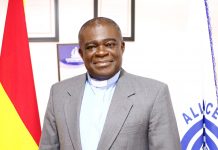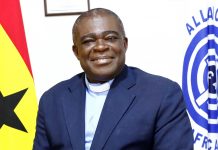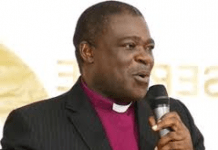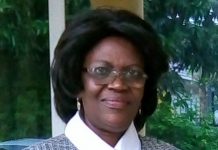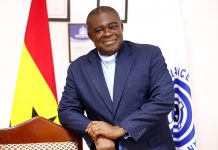|
Getting your Trinity Audio player ready...
|
TOPIC: PEACE, RELIGION AND ELECTION 2016
MEDIA HOUSE: AHOMKA FM, UK
DATE: 15-07-2016
Jemima:Good afternoon Rev. Let me ask you is Ghana really religious state?
I don’t know what exactly you have in mind but
Jemima:We are discussing peace, religion and election 2016
Rev Dr. Opuni-Frimpong: officially Ghana has not been declared a religious state whether a Christian, Muslim, some countries are known as Islamic states and they are governed by say some countries are known as Christian faith and they are supposed to be governed by Christian norms or values and in that case Ghana is not a religious country because officially we havenot declared for any particular religion however, we have demonstratively a high size of our population if you put Christians, Muslims and traditional worshipers altogether you will have evidence that highly Ghanaians are very religious.
Jemima: Thank you very much, now tell me how the meeting has impacted or advanced our democracy and has it been worthwhile?
Rev Dr. Opuni-Frimpong:Ghanaians will use their religious perspective, views and values in interpreting realities and events in shaping their views of public opinions. One of the tools that people use in shaping their views infact is not peculiar to Ghana. Many people will use their religious views, values, and perspective to interpret what is happening around them. In that case, religion depending on how we handle it has a very stronghold in people’s views and opinions on realities around them and therefore those who are in charge of religion, if they position themselves well can handle the state values well and use religion as a tool for destruction butto pursue the common good of the people; then yes religion can facilitate growth in democratic environment and quantitate development but there is a way religion can frustrate development if we don’t handle it verywell.
Jemima: So how has religion impacted our electoral process?
Rev Dr. Opuni-Frimpong: I will say that Ghana if you compare Ghana with other West African and other African countries, Ghana has made some large extent stable level of national cohesion and among others. Christians, Muslims and traditional leaders have played very significant roles in terms of public education. As a minister and the General Secretary, let me talk more on what the Christian Council have been able to do for almost 87 years. Public education – what are the issues the churches have to use their platforms through public education in the area of reconciliation, We have had challenges as a country military, dictatorship and moving from one government to another, the churches have been there having meetings with leaders, the major political parties, the electoral commission, talking to our young people and then also what we call interfaith harmony. Christian-Muslim leaders do a lot of meetings and sometimes what is the challenge is in other countries that are difficult to handle. Sometimes Politician would want to use and place a religious par. Christians against Muslims and Muslims against Christians that kind of game and then the religious leaders will come together and say we are the same people and we don’t want you to destroy Ghana in the name of religion. In the area of development, at the moment 40% of all health facilities in this country are owned by the churches. The Christian council of Ghana and Catholic Bishops Conference owns 40% of all hospitals and clinics are owned them. So they are not only talking about people going to heaven but help mobilize resources and they make sure Almost all the best second-cycle institutions in Ghana belongs to the churches; the Aburi Girls, Opoku Ware, Prempeh College, Wesley Girls, Mfantsipim. I don’t know where you attended your second cycle school whether in Ghana or outside but all these schools belong to the churches and at least they were initiated by the churches so the churches are physically also mobilizing resources and also making significant contribution whether in the area of health, education and employing many people. Now tertiary education all over and you will find the Presbyterian University College, Methodist University College, and Central University all over so all these are facilitating the peace we are enjoying.
Jemima: right what role is the Christian Council doing in nation building and for that matter our electoral process?
Rev Dr. Opuni-Frimpong: I mentioned earlier that we together with Christian – Muslims do a lot of meetings and team up together and talk to our people because some of politicians are Christians and Muslims and so we constantly engage them and so in the area of engaging politicians. At the moment the challenge we are having is the public discourse faith-peace choice of words that are delegatoryand now the religious leaders are all over that no this is not the way we should go, Muslims leaders engages their people, Christian leaders engaging their people and the traditional leaders engaging their people. And so we use our interfaith approach to engage our people and then strong engagement
We engage the society as well the Police, Electoral Commission, government officials and political parties, we do a lot such closed doors meetings. At the moment the Christian Council of Ghana is going round the whole country bringing Christian leaders, pastors, youth leaders, and group leaders in the community together and educating them what the church and Christians our roles should be. Sometimes we make our facilities, chapels, classrooms available to facilitate what the electoral commission is doing. On the whole, we have a lot of media engagements educating people as we go round. The Christian Council was invited by the parliament to contribute whether we should have our election in November or December and we do many more.
Jemima:Let me ask you our position and processes do we have at all in nation building?
Rev Dr. Opuni-Frimpong: You see Jemima you can choose what we call theocracy that is the rule of governance and when you read the bible in the Old Testament if they needed a leader God will send a prophet and then the prophet will come and say thus sayeth the Lord meaning this is the person God wants to rule. Some churches do so when they want choose a leader. Another way of knowing God’s will in terms of choosing a leader is through the ballot box through the will and the demonstration of the will of the people that is democracy. Now you don’t confuse the two, if you choose democracy – electoral process as the way of knowing God’s will then you don’t force prophesies on election. Now in our churches, many of our churches also vote and in that case no individual can come – am a Presbyterian, if the Presbyterian Church needs a Moderator or the Methodist Church needs Presiding Bishop, the acceptable norm is that we are going to vote, they will fast and pray but then the mechanism or the process of knowing our leaders is through election. Now If you choose that part or arrangement then you don’t force prophesy or anybody. You go through election and whoever wins becomes the leader.
So even in church when we choose to vote, we don’t force prophesy on anybody. Now when you come to the national process for instance in Ghana, we are under democracy. We find our leaders through election, in that case nobody should force prophesy on this nation that I am a man or woman of God and that i have known the person so Ghanaians should accept; this is not right. But we must be praying, we will want our members and pastors to be praying. God may whisper something to you but don’t impose that on the nation but you pray for the will of God to be done. So as for prediction, is allowed but you don’t impose it. It’s like we are going to play football or we are having a beauty contest people are free to make their own analysis and to conclude that in this beauty contest Jemima will win or in European football Portugal will win. Your prediction may come true or not. If you arepredicting, I think people must be sincere this is prediction but if you call it prophesy then you are saying that sayeth the Lord, this is God’s word and if this is God’s word who am I to disobey him so in that case you are forcing us to go in a certain way which is not right.
Jemima:So what do you make of the religious leaders who seemingly aligning themselves to political parties or acting in a way to suggest polls?
Rev Dr. Opuni-Frimpong:at the moment we have witnessed few of that and you can’t be hearing other Christian leaders a caution that is not the best under the dispensation we find ourselves, we should be praying more, we should be providing what we called pastoral care to our members who are into politics, we must do more of public education, we must do issue based election. The Ghanaian voter must be discerning and they must understand what the issues are and this is not the time to attract, install especially our young peopleshould not allowed themselves available be used as tools for violence so as a Pastor as you pray, you wait upon the Lord you must add public education, human effort, what are the right things we must do and let the Lord’s will be done that this idea people come out and say that this will person loose, Ghana will have civil war if this person doesn’t win and we feel that the churches should not go that way, of course sometimes you get one or two people who will still disturb the waters and that makes it part of democracy.
Jemima: Alright,what message do you have for Ghanaians Rev?
Rev Dr. Opuni-Frimpong: especially for our friends in the diaspora we are in together
We have oneGhana; we can raise, destroy one and keep the other but is the only country we have. We need peace,growth and development but it’s a collective responsibility, those of us back at home and those of us who are outside everybody must be part of this and those who can come home and vote there’s nothing wrong some will go left and some will right. We cannot all belong to one political party and Ghana is not one party state so there’s nothing wrong that some Ghanaians are in NPP and some are in NDC and the other political parties but we must do we call context of ideas not exchange of bullets and so those who are here and those outside please facilitate context of ideas if people are coming to you to be part of violence let us be bold enough to say is not the way we should go out and support; my money and idea will not go to support that and that is the Ghana we want to build. We want a better Ghana for the generation that will come after us. Ghana is so blessed with natural resources talk about gold, forest we shouldn’t be poor as a young people must have a brighter tomorrow but is a collective responsibility so we want to invite everybody on to be on board but please let us do it for the sake of those who will come after us, the young people, our children. This is the only country we have, we are so blessed let us build Ghana and make sure our young people have a safer tomorrow, brighter tomorrow. They may travel want to travel outside but then they still feel I have a better place. Thank you Jemima; your team and listeners. May God bless us all.
Jemima: God bless you too Rev. Opuni-Frempong we must thank you very much for your time Sir. Thank You




